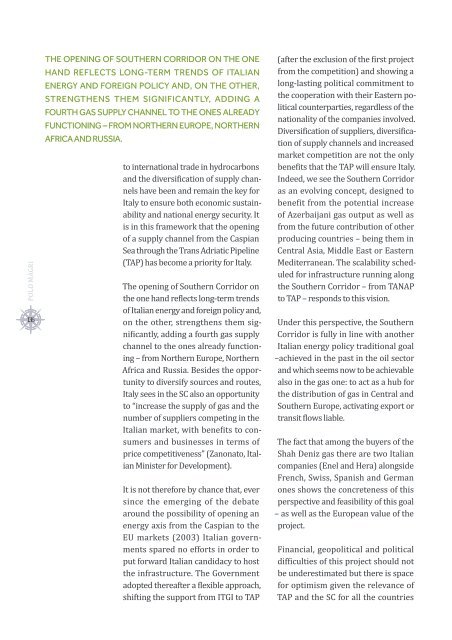Caspian Report - Issue 06 - Winter 2014
You also want an ePaper? Increase the reach of your titles
YUMPU automatically turns print PDFs into web optimized ePapers that Google loves.
POLO MAGRI<br />
136<br />
THE OPENING OF SOUTHERN CORRIDOR ON THE ONE<br />
HAND REFLECTS LONG-TERM TRENDS OF ITALIAN<br />
ENERGY AND FOREIGN POLICY AND, ON THE OTHER,<br />
STRENGTHENS THEM SIGNIFICANTLY, ADDING A<br />
FOURTH GAS SUPPLY CHANNEL TO THE ONES ALREADY<br />
FUNCTIONING – FROM NORTHERN EUROPE, NORTHERN<br />
AFRICA AND RUSSIA.<br />
to international trade in hydrocarbons<br />
and the diversification of supply channels<br />
have been and remain the key for<br />
Italy to ensure both economic sustainability<br />
and national energy security. It<br />
is in this framework that the opening<br />
of a supply channel from the <strong>Caspian</strong><br />
Sea through the Trans Adriatic Pipeline<br />
(TAP) has become a priority for Italy.<br />
The opening of Southern Corridor on<br />
the one hand reflects long-term trends<br />
of Italian energy and foreign policy and,<br />
on the other, strengthens them significantly,<br />
adding a fourth gas supply<br />
channel to the ones already functioning<br />
– from Northern Europe, Northern<br />
Africa and Russia. Besides the opportunity<br />
to diversify sources and routes,<br />
Italy sees in the SC also an opportunity<br />
to “increase the supply of gas and the<br />
number of suppliers competing in the<br />
Italian market, with benefits to consumers<br />
and businesses in terms of<br />
price competitiveness” (Zanonato, Italian<br />
Minister for Development).<br />
It is not therefore by chance that, ever<br />
since the emerging of the debate<br />
around the possibility of opening an<br />
energy axis from the <strong>Caspian</strong> to the<br />
EU markets (2003) Italian governments<br />
spared no efforts in order to<br />
put forward Italian candidacy to host<br />
the infrastructure. The Government<br />
adopted thereafter a flexible approach,<br />
shifting the support from ITGI to TAP<br />
(after the exclusion of the first project<br />
from the competition) and showing a<br />
long-lasting political commitment to<br />
the cooperation with their Eastern political<br />
counterparties, regardless of the<br />
nationality of the companies involved.<br />
Diversification of suppliers, diversification<br />
of supply channels and increased<br />
market competition are not the only<br />
benefits that the TAP will ensure Italy.<br />
Indeed, we see the Southern Corridor<br />
as an evolving concept, designed to<br />
benefit from the potential increase<br />
of Azerbaijani gas output as well as<br />
from the future contribution of other<br />
producing countries – being them in<br />
Central Asia, Middle East or Eastern<br />
Mediterranean. The scalability scheduled<br />
for infrastructure running along<br />
the Southern Corridor – from TANAP<br />
to TAP – responds to this vision.<br />
Under this perspective, the Southern<br />
Corridor is fully in line with another<br />
Italian energy policy traditional goal<br />
–achieved in the past in the oil sector<br />
and which seems now to be achievable<br />
also in the gas one: to act as a hub for<br />
the distribution of gas in Central and<br />
Southern Europe, activating export or<br />
transit flows liable.<br />
The fact that among the buyers of the<br />
Shah Deniz gas there are two Italian<br />
companies (Enel and Hera) alongside<br />
French, Swiss, Spanish and German<br />
ones shows the concreteness of this<br />
perspective and feasibility of this goal<br />
– as well as the European value of the<br />
project.<br />
Financial, geopolitical and political<br />
difficulties of this project should not<br />
be underestimated but there is space<br />
for optimism given the relevance of<br />
TAP and the SC for all the countries










